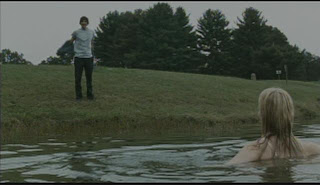It revolves around a young man by the name of Carter, played by Lukas Haas, an actor who I last remember in the role of a small Amish boy in the movie "Witness". He conveys all the awkwardness of a young man in his twenties who is still trying to find his way, and who finds himself drifting in life. Carter comes from the working classes, and he is mesmerized by the seductions of the higher classes, seductions that one may add are pernicious because they are based on an idea that he is somehow unworthy.
He works as a mechanic at a shop run by an African-American man ("Leroy") and his son in the southern town of Charlottesville, Virginia. It feels like the southern towns I have traversed in Tennessee, an area with lush and verdant rolling hills and with a feeling of autumn. This is also evidently a college town in which the two social classes coexist uneasily, and we get a glimpse of this in the idea of mirrors and reflections and in the juxtapositions that situate him in gritty working settings that contrast with the comfort and luxury of upper-class abodes. One can sense the degree of discomfort he must feel when he ventures into an ice-cream shop during his nocturnal walks through town. He does not fit in with other college students, and yet he is attracted by the idea of absence and a longing to find what is missing.
He is looking for something, and he thinks he has seen it in an ostensibly cultured girl named Ann Shelton who plays the violin and who lives near a campus. He watches her from afar, never daring to reveal himself and always feeling himself out of place, like the working class characters in the movie "Breaking Away" which is a classic from the eighties, and is set in the south of Indiana.
The object of Carter's obsession, Ann, has no reason to take notice of him. She would undoubtedly be horrified if she were to discover that she was being observed by this young mechanic who has established a ritual that involves standing quietly in the dark, watching her as she plays her instrument by the side of a window. She seems almost too perfect and, to my taste, almost plastic, like a woman who is all surface and no depth. At least this would be so if not for the music.
It is emblematic of this movie that Carter is himself watched, and this can't help but set up the premise that they are all lonely people who don't know how to reach out to others. Watching is a poor substitute for participation and engagement, and instead, what it does is accentuate fears in an act that will ironically increase the sensation of absence and longing. The melodies of this college student are ethereal, and they serve to entrance him in a rather destructive way because they distract him at the same time as they inhibit him. She is so different that he wouldn't know how to reach out to her if given the opportunity, and he will get that opportunity towards the end.
Little does he know that he has attracted the attention of a working-class waitress, Darla, who serves him and his coworkers at a small burger joint. She is played in a surprising turn by January Jones, the actress who plays the conflicted and bitter Betty on the AMC series "Mad Men", but who here seems completely transformed. She exudes quiet timidity and insecurity, and a palpable vulnerability. Darla wishes to escape her surroundings while wishing to protect her mother, an even more vulnerable woman who is addicted to morphine and who is being abused by a cancer-stricken boyfriend. This same boyfriend abuses Darla, forcing himself on her sexually while threatening her mother. She is suffused with a feeling of sadness of self-loathing, but she also finds something uplifting in Carter, a protector who is also idealized if, perhaps, in a lesser degree than the way in which he idealizes his college student.
They are two lonely people and they eventually overcome the first barrier that involves mutual gazing and they reach out to each other, in a scene that captures all the release from pain that they both desire. In a movie that proceeds with a slow and quiet pace, it is inevitable Carter's quiet compassion and empathy would seduce her, even though their relationship seems very chaste in other ways.
Events come to a head and, after an idyllic interlude in which Carter and she take a trip out to a lake, taking a Swedish car that he has restored himself, it finally becomes necessary to think in terms of restoring and upgrading their own relationship. They are both stricken by insecurity, and this sounds one of the most authentic notes of this story, one that furthermore resonates with me as I think back on the people I knew and the person I was back at that age.
They are both finally able to let go, but only after Carter is forced to make a decision. He makes one final visit Ann, college violin virtuoso, one that crystallizes this idea of distance and the way in which one's gaze can obscure the possibility of real intimacy.
It is a story of longing and of a difficult reconciliation with interior demons, and of an eventual release.
Copyrights ORomero 2011







No comments:
Post a Comment